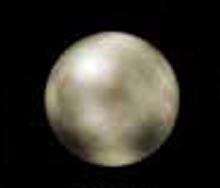Earlier today, astromers voted on a definition of "planet" that demoted Pluto from a planet to a Kuiper Belt Object.

The decision establishes three main categories of objects in our solar system:
Planets: The eight worlds from Mercury to Neptune.
Dwarf Planets: Pluto and any other round object that "has not cleared the neighborhood around its orbit, and is not a satellite."
Small Solar System Bodies: All other objects orbiting the Sun.
(By this definition, Pluto is now classified as a "dwarf planet," although "dwarf planets" will not be considered to be actual planets. But I digress.)
The new regulations define a planet as: "a celestial body that is in orbit around the sun, has sufficient mass for its self-gravity to overcome rigid body forces so that it assumes a ... nearly round shape, and has cleared the neighbourhood around its orbit." Pluto is automatically excluded from the definition because its orbit overlaps with Neptune's.
This definition is cumbersome and subjective. Clearly, Neptune is not a planet anymore either because if its orbit crosses Pluto's orbit, it hasn't cleared the neighbourhood around its own orbit.
What about other solar systems? Would both planets of a double planet pair (that is two planets that revolve around a point in space as they revolve around a star) not be considered planets because neither has "cleared out the neighbourhood." The other planet of the pair is still there. So even a double Jupiter-like gas giant pair would not qualify as planets?
The previous proposal that saved Pluto, and brought Ceres, Charon and 2003 UB313 into the planet club, worked. Yes, it had the potential to increase the number of planets in our solar system from nine to hundreds, but so what? Some argued that it was flawed because the status of some objects might change over time. For instance, one day our moon would qualify as a planet under the first proposal. Rather than a detriment, this aspect of the proposal demostrated something that we seem to have forgetten: that the universe is growing, expanding and ever changing.
And not as fixed and static as The Group of Eight supporters would have us believe.
No comments:
Post a Comment